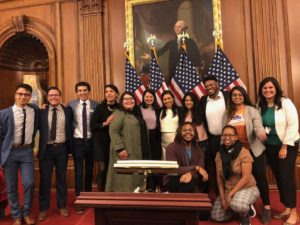More than two dozen immigrants chanted “Sin Papeles, Sin miedo, No Papers, No Fear” as they stood on the podium at the Capitol in DC before starting the press conference on Tuesday.
As we were chanting, Democratic members of the House of Representatives came to join us. This action showed the power of the immigrant rights movement. We lifted up our voices and organized in the streets, in Congress and in the voting polls. These actions became the shining light towards justice that made it so that Democratic leadership in the House would once again put their energy into trying to reform the immigration system, one step at a time.
The immigrants on the podium were immigrant youth who have DACA status, individuals with temporary protected status (TPS) and some for whom deportation has been deferred (known as DED holders.)
This bill and our appearance represents the dreams of almost a million immigrants who have rooted themselves in the American soil. As Rep. Steny Hoyer from Maryland said in the press conference, “Immigrants’ dreams make this country greater.”
For my own journey as a DACA holder, this bill means being able to go back to Colombia, which I left at 15, and visit my family and the mountains that saw me become a man. It would mean hugging my aunt again and visiting my uncle’s grave, who I didn’t get to see before he passed away two years ago. I couldn’t leave the country because DACA does not provide the ability to travel. It also means that I can finally stop being scared of being deported.
I am inspired that so far that H.R. 6, the Dream and Promise Act, has more than 200 co-sponsors in the House. It reminded me of the 2018 midterm elections when I went with the Florida Immigrant Coalition Votes to Tampa to knock on doors dressed as a Ninja Turtle for Halloween. I remember a conversation I had with a woman who said she didn’t want to vote. I told her that it was important for us to vote to send politicians a message that we are paying attention to what they do. She didn’t see much interest in voting until I told her 13-year-old son I was undocumented and even though I couldn’t vote, I was there getting people to vote so that 11 million immigrants like myself wouldn’t be deported. I asked him: “Do you want people to be deported?” He said no and asked his mom to vote.
This little boy understood how his family’s destiny was tied with mine. In this life-giving web of relationships and actions that affect our neighbor, I was pleased to see the result of these elections in Congress. The most diverse class of representatives in terms of gender, race and ethnicity. I was reminded of House Majority Leader Nancy Pelosi’s words: “And these newcomers make America more American. And we want them, when they come here, to be fully part of our system. And that means not suppressing the vote of our newcomers to America.”

I stood in the podium with Rep. Nydia Velazquez of New York, a Puerto Rican daughter of a sugar cane worker who organized around workers’ rights. I heard her speak with the Nuyorican accent. That English decorated with the flavor of the Caribbean that sways like the congas in a good salsa song slowly asking, “What kind of nation do we want to be?” As she asked this, I wondered whether the Senate would support a pathway to residency for almost a million people. I wondered what do we as immigrants need to do to help the Senate and anti-immigrant Republicans understand that the American people want to choose the America that stands for immigrants and for justice?
For my part, I am inspired by the opportunity we have from today until the 2020 elections. The ability to make sure the power of our stories become the guiding winds that steer the ship of democracy towards the promise land. As Jesica Garcia Garcia, a 21 year old DACA holder said, “The bill is not just about dreams but about reality and in a great, diverse and strong country such as the U.S.A.” I hope that the Senate and the President hear her story of dedication and hard work. I hope they understand that despite the pain they cause with their unjust laws and oppression, we are blooming like roses in concrete. We are organizing our communities so we can shine sunlight on their darkness.